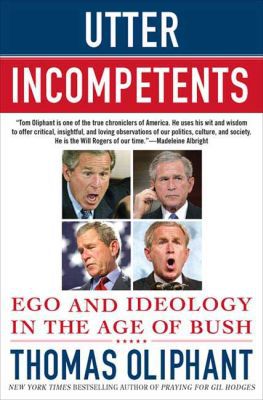

| UTTER INCOMPETENTS Ego and Ideology in the Age of Bush Thomas Oliphant New York: St. Martin's Press, 2007 |
Rating: 5.0 High |
|||
| ISBN-13 978-0-312-36017-7 | ||||
| ISBN-10 0-312-36017-7 | 291p. | HC | $24.95 | |
"On his way for a chat with me before bringing out a memoir that summer of my New York childhood and my first love, the Brooklyn Dodgers, [my publisher] Mr. Dunne opened his laptop on the plane and let rip a most delightful screed, the main point of which was that there was no important topic one could list of which President Bush was not making a colossal mess—domestic as well as foreign. In another notion that would not become chic for at least a half-year, he used an adjective them not generally in use in descriptions of the Bush administration—incompetent." – Page vii (Acknowledgements) |
Tom Oliphant is a veteran columnist for the Boston Globe. Here he examines sixteen areas of government for which the Bush administration had responsibility, from justice to war to weather emergencies. His motivation was the idea that there must be some root cause, some underlying pattern, that would explain why all those areas were being handled so badly. He found that, "Gradually a picture emerged strongly suggesting that this fish rotted from the head."
His detailed analysis bears that out. Examining both the policy and the politics of Bush administration actions, he makes a solid case that most errors in judgement began with the president. Even in the cases of "loose cannons" like Dick Cheney and Donald Rumsfeld, or of loyal cronies like Andrew Card and Karl Rove, Bush bore the ultimate responsibility for their presence on his team and for their performances in support of his objectives.
Oliphant reports on pages 92-98 some statistics about the economy, including analyses by Lee Price and by Elizabeth Warren and her daughter Amelia Warren-Tyagi. These demolish any pretense that middle-class and lower-income people did well under Bush. For example, according to Rep. Barney Frank, between 2001 and 2006 corporate profits as a percentage of national income nearly doubled, from 8 to 14 percent, while wages fell by 3 percent.
| 2001 | 2006 | |
|---|---|---|
| Corporate Profits | 8% | 14% |
| Wages | 66% | 63% |
Thorough is the word for this book. Whether discussing the larger issues of the Iraq War and health care, or the personal predicaments of John Walker Lindh and Terry Schiavo, Oliphant presents a wealth of information and uses it to build a solid case for his thesis. The reader is left with the undeniable conclusion that the manifold messes that gurgled out of the Bush administration flowed from its head, the president.
Oliphant's examination of what happened on the American political stage during those eight years is broadly similar to Louis Lapham's Pretensions to Empire, except that Lapham takes a more comprehensive look at that stage (and that, based solely on these two books, I think Lapham is the better writer.)
Among the things I learned from this book are some new names to praise and blame. (Not all are completely new to me, but the related information is new.) I list them below, purely for future reference. But I want to highlight one, because her story reflects so much of what was wrong with the Bush administration.
Jesselyn Radack, a young DOJ lawyer, questioned the interrogation of American citizen John Walker Lindh by the FBI without his lawyer present. As a result, she received a bad performance report and left government, joining a private law firm. Later, when she read in Newsweek that the DOJ claimed it did not know Lindh had a lawyer, she gave Lindh-case documents to that magazine. She was placed under investigation, and her law firm dismissed her after the DOJ notified them of this. Although the Maryland bar has cleared her, the D.C. bar still has her under review.3
I learned quite a bit that I had not known before, about S-CHIP and HSAs and CFIUS and the manufactured energy crisis that hit California1 in 2001 — and especially regarding the flawed response to Hurricane Katrina and the defects of the administration's vaunted emphasis on homeland security.
"The record, from the beginning, is devoid of evidence that the consequences of these tactics were seriously considered." – Page 191 |
For that reason, I consider it a must read; and because it has an excellent index, I'll provisionally rate it a keeper. (There are no endnotes. I gather that the facts presented come from Oliphant's own notes, built up over the course of covering the administration. Thus the reason for my provisional rating is that if a reference is wanted, there are better choices.)
Overall, the book reads well and quickly. However, there are several instances of poorly worded and sometimes confusing sentences.4 Oliphant has a tendency to run-on sentences without commas, and some of these lack a verb in their ultimate clause. There are dangling participles, errors of number, mismatched punctuation marks, and a few typos or dictation errors. (Some of these may be due to editors.) In my opinion he repeats too often the theme of how pervasive Bush's incompetence was found to be. He should probably also devote some attention to writing more in the active voice. The book would have benefitted from another editing pass. My suspicion is that this was precluded by its publication schedule. No matter all these defects, the book is well worth reading.

 To contact Chris Winter, send email to this address.
To contact Chris Winter, send email to this address.